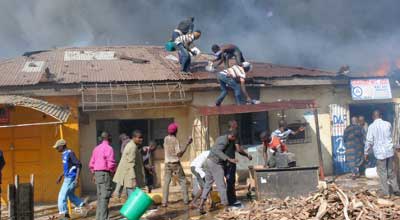ACLJ Demands Nigeria Protect Persecuted Christians
Following the discovery that some 200 Christians have been killed and more than 500 churches attacked, The American Center for Law & Justice, or the ACLJ, is calling on the government of Nigeria to take action.
The attacks occurred in 12 northern states in Nigeria in an outbreak of post-election violence last April. The ACLJ in the early stages of its work in Nigeria and the violence was uncovered during a fact-finding mission in the African nation.
“It is very disturbing to find that Christians were specifically targeted and, in many instances, killed because of their religious beliefs,” says Jordan Sekulow, executive director of the ACLJ. “We’re calling on the Nigerian government to take corrective action and to prosecute those responsible for these crimes.
“At a time when Christians face persecution in so many parts of the world, it’s important that Nigeria step up and take the corrective action necessary to ensure that the religious and civil rights of Christians are protected.”
The ACLJ findings were also corroborated by a report prepared by the Christian Association of Nigeria (CAN), which submitted its data to a presidential panel. The ACLJ’s fact-finding mission observed specific instances of extreme prejudice against people of faith:
- • In Bauchi state, Muslim youths accosted a rural missionary at a roadblock and dragged him into a mosque after being singled out as the sole Christian in the taxi. After repeated orders to renounce his faith, the Muslim youth gouged out missionary’s eyes and stabbed the missionary before incinerating his body in flames.
• In Kano state, a church secretary ran to a police station three times for help when Muslim youths converged on his church office. The police refused to respond and, as a result, the Muslim youths systematically burned 15 churches. The Muslim youths returned several days later to finish off one building they had missed.
• In Jigawa state, a senior police officer visited a conclave of Christian churches and promised them protection. Moments later, while he was still within the vicinity, a band of attackers besieged the churches and burnt them in full view of the police. After protests by the pastors, some of the suspects were arrested; however, the police immediately released the suspects.
• In Gombe state, a woman and her family were set ablaze in their own home. Though she was rushed to a hospital, the hospital refused her admission. Subsequently, another hospital accepted her for treatment, but she eventually died from 3rd degree burns over 80 percent of her body.
• In Kaduna state, Muslim youths invaded a federal university and destroyed the Christian chapel directly adjacent to campus security building. At off-campus residences, the Muslim youths targeted only Christian students by throwing their belongings into the street before setting them ablaze.
These are just a few of the more egregious instances documented during a three-month investigation from May to July 2011 that included travel to most of the 12 states that experienced the worst of the violence. These attacks were replicated on a similar pattern in all 12 states.
The ACLJ notes that there were backlashes from Christians in one state. In Kaduna state, the ACLJ noted Mosques burnt in the southern “Christian” side of the state capital and also in the southern part of the state. Reprisal attacks occurred in some communities while defensive actions were carried out in others. As a result, Kaduna has the worst overall impact with thousands of people losing commercial and personal property and tens of thousands across the north displaced.
While commending the federal government for appointing a panel to look into the crisis, the ACLJ is concerned that this panel will mimic the plethora of similar panels appointed in Nigeria over the last quarter century of sectarian persecution. Nothing much has come out of these inquiries. Indeed some of the churches burnt in recent months had been rebuilt after being burnt in 1987.
The ACLJ is particularly concerned that the current panel is handicapped by too little time to effectively gather comprehensive data; overly restrictive terms of reference that focuses on damage assessment but not perpetrator identification; overly burdensome requirement for Internally Displaced Persons to provide professional bills of quantities for their lost houses; and inadequate information and public awareness of the public hearings held by the panel.
The ACLJ urges the Nigerian government to compensate the victims in a timely manner to facilitate a quick recovery; promptly and diligently prosecute offenders to end impunity in the worst cases of religious discrimination cloaked as political protests; investigate and punish instances of reported complicity, negligence or inaction by law enforcement authorities; clearly redefine rules of engagement during civil strife to ensure the protection of civilian populations, especially vulnerable and endangered minorities; release a comprehensive report of its findings; and initiate an action plan to implement recommendations for resolutions.















































